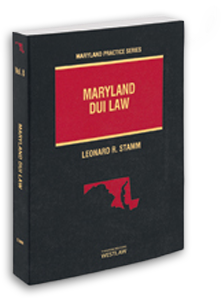(Vol. 8, Maryland Practice Series)
By: Leonard R. Stamm
Federal DUIs
There are two kinds of federal DUIs depending upon where the arrest was made
If the arrest was made on property under the jurisdiction of the National Park Service, such as the Baltimore-Washington Parkway, Suitland Parkway, Canal Road, or elsewhere, the charges are made under the Code of Federal Regulations. The maximum penalties are 6 months and/or a $5,000 fine. There is no right to refuse the breath or blood test, and people who refuse a breath test are normally taken to a hospital where blood is withdrawn. Refusal is also a crime, carrying the same potential penalty. Even though refusal is a crime, the United States Supreme Court decreed in Missouri v. McNeely, that police are normally required to obtain a search warrant from a judge before obtaining a sample of the driver’s blood. Unlike state prosecutions, since refusal is a crime, there is probably no right to consult with a lawyer before deciding whether to submit to a test as there is in arrests made on state property. Trials are usually before a United States Magistrate judge and there is no right to a jury trial. There is no PBJ or probation before judgment available, so if the judge finds the person guilty it results in a conviction. However, no points appear on the MVA driving record. There is also usually no suspension of driving privileges before or after court, at least on a first offense. Convictions may be appealed, but there is no new trial on appeal as there is in state court. Rather the appeal is on the record, based on errors committed by the trial court judge.
The second kind of federal DUI occurs on property not under the jurisdiction of the National Park Service such as Andrews Air Force Base, Ft. Meade, the National Institutes of Health, and other locations. Here a federal law called the Assimilative Crimes Act applies. Under the Assimilative Crimes Act, if there is no federal criminal law on conduct made criminal under the law of the state in which the federal property is located, the state’s criminal laws apply. Since there is no federal DUI law, Maryland DUI laws apply on federal property located in Maryland which is not under the jurisdiction of the National Park Service. Under this scheme, the state crimes and penalties of DUI and DWI apply, but federal procedures are used in federal court. Defendants do have a right to a jury trial. Breath test failures and refusals are referred to the MVA as in state cases, but whether the MVA can legally suspend the drivers license for a violation on these federal properties is debatable. Since the penalties are the same as in state court, a defendant can get a PBJ on a first offense. If there is a conviction (no PBJ), points do appear on the driving record and the MVA will seek a suspension or revocation of the drivers license.
Unlike state court, in federal court some judges believe it is permissible to reward a defendant who pleads guilty and conversely, sentence a defendant who is found guilty after a trial more harshly.
For more information concerning federal DUIs click here.












